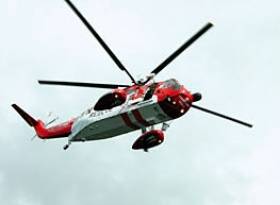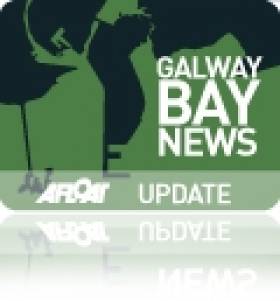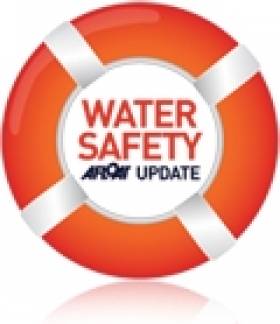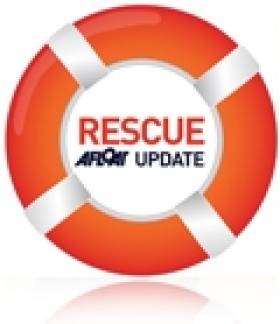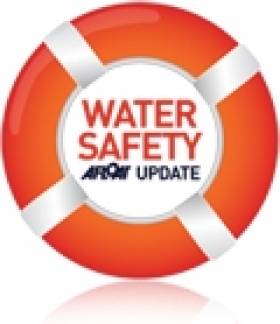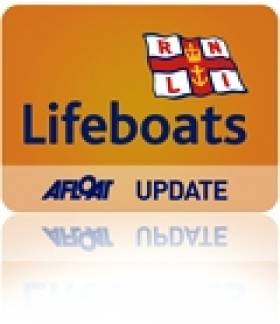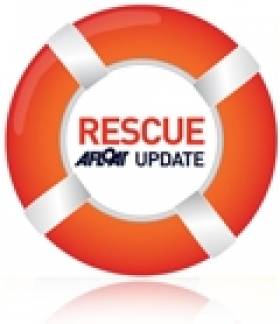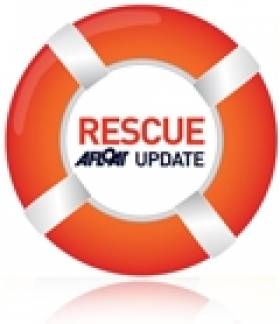Displaying items by tag: Irish Water Safety
Coast Guard, RNLI & Irish Water Safety Issue Caution
The Irish Coast Guard, the RNLI and Irish Water Safety advise caution to those engaged in recreational activities in or near water during the current spell of good weather and throughout the summer months.
There has been a significant rise in maritime recreational incidents over the weekend due to the good weather.
At this time of the year as the secondary school term comes to a close and the fine weather is upon us, members of the public are urged to take care when engaging in aquatic activities.
Chief of Operations, Coast Guard Eugene Clonan, said “there has been a noticeable increase in the number of calls over the weekend. Sunday was particularly busy with twenty three calls in response to maritime recreational incidents and he urged members of the public, particularly younger people to exercise caution in and around the water”.
Gareth Morrison RNLI Lifesaving Delivery Manager said, ‘As the weather improves we notice an increase in callouts for our lifeboats. Many of these incidents relate to leisure activities where a nice day out has unfortunately ended in a call for help. Seeking some simple advice before you take to the water or coastline could make all the difference. Our volunteer lifeboat crews are always on call but when every second counts in an emergency you need to be prepared. The RNLI urges everyone to Respect the Water.’
Roger Sweeney, Deputy CEO of Irish Water Safety said that “Ireland averages eleven drownings every month and that constant responsible child supervision will help prevent further tragedies. Parents should check that their local primary school is teaching Irish Water Safety’s classroom based curriculum that instils good habits for a safe summer ahead.”
• The temperature of the sea, lakes, canals and inland water ways is still pretty cold and waters users should exercise caution and be aware of cold water shock and hypothermia.
• Swim with others, never alone, close and parallel to shore.
• If walking on the beach be careful that you are not cut off by the tide. Seek local information about stranding risks.
• Members of the public using recreational craft at the beginning of the season should check the seaworthiness of their craft before launching, particularly engines.
• When departing check the weather forecast, tell someone where you are going and when expected back and wear a life jacket when going afloat.
• For further information on safety on the water check www.safetyonthewater.ie.
• If you see someone in difficulty in the sea, on the shore, cliffs, lakes or rivers dial 999/112 and ask for the Coast Guard.
New Book Celebrates 'History Of Irish Water Safety'
#WaterSafety - Irish Water Safety's "long and proud history" has been paid tribute in a new book by author Tiarnan O'Sullivan
The History of Irish Water Safety is the culmination of two years of research by the Cork-based writer, who has been involved with IWS since 2002 both as a pool and beach lifeguard and as an instructor and committee secretary.
The result, published just in time for Christmas, comprises 288 pages of reflections and remembrances from people involved in the organisation right back to its very beginnings in 1945.
Available to order from Irish Water Safety, The Long Walk, Galway or online via [email protected], the book costs €25 for the hardback edition and €15 for the paperback.
Irish Water Safety's National Beach Rescue Championships at Spanish Point Beach
Spanish Point beach in Clare will be amongst the safest in Ireland this Saturday when 152 Lifeguards from nine counties test their skills at Irish Water Safety's National Beach Rescue Championships.
Simulated emergency rescue scenarios incorporating running, swimming, kayaking and paddle boarding race formats are designed to test their lifesaving skills.
These championships will see trained lifeguards compete in beach and open water events of this multifaceted sport which has Olympic Category 2 standing and is recognised by the World Sports Federation.
Irish Lifeguards won a record eighteen medals in August at the European Rescue Championships in Wales.
Competitions throughout the year see Lifeguards qualify as the top competitors in the country who now go head to head for the overall national title. The 152 competitors represent the best in a discipline in which 113,000 members of the public were certified to various levels by IWS last year.
The value of this training is reflected in the fact that 831 people were rescued from drowning by Lifeguards at Irish waterways last year.
"The sport of Lifesaving has been developed to improve the standard of lifeguarding in Ireland," commented Seamus O'Neill, chairman of Irish Water Safety's Sports Commission. "This gives us great confidence in the skills of our lifeguards on Ireland's beaches and waterways."
Galway's Successful Launch of 'Try Sailing'
#trysailing – Galway Bay Sailing Club held the West of Ireland's first " Try Sailing " launching over the weekend, with up to 400 people getting on the water yesterday for the ISA's new initiative, which is part of an Access and Participation programme linked with Irish Water Safety to promote water safety and sailing.
Developed from a suggestion from Muriel Rumball of the Irish National Sailing School in Dun Laoghaire, the linkup with IWS allows promotion of the programme in schools, and the numbers involved showed the success of this approach.
Around 175 were complete beginners who had never before been on the water in Galway. And it was like the previous night 's Eurovision, with eleven different nationalities represented - our "new Irish" citizens are keen to get afloat.
The Day was co-ordinated by GBSC Public Relations Officer Phyllis Hayes, who organised up to 60 boats and nearly 220 members including juniors, parents, instructors and officers. Irish TV.ie covered the day's events, which will be broadcast on 15th June , which is the first day the first day of IWS Water Safety Week. And there will be another Try Sailing initiative to round out the week on June 21st, Midsummer's Day.
New Website For Schools Promotes 'Water Safety Fun'
#WaterSafety - Irish Water Safety (IWS) has launched its new water safety website for primary school teachers, pupils and parents.
The site for IWS' Primary Aquatic Water Safety programme, or PAWS, combines clear, simple water safety messages with material for use in classrooms, as well as free certificates for children who complete the programme.
Though designed for delivery in primary schools, IWS says the resource can help generally to change the attitudes and behaviours of children playing in, on and near the water – whether by the sea, on the beach, by the river, canal or any body of water.
Noting that 30 children aged 14 and under drowned in the last decade, IWS hopes that teachers will set aside some class time for the new website before the summer holidays to help everyone respect the water and make 'Water Safety Fun'.
Irish Water Safety Hosts International Life Saving Europe (ILSE) Meeting
#watersafety – International safety standards of water rescue, resuscitation and water safety will be discussed when Irish Water Safety hosts the board of International Life Saving Europe (ILSE) for an Extraordinary General Assembly, annual commission meetings and best practice seminar in Dublin on January 15th - 17th.
This is the first time that Ireland has ever hosted these meetings with just fewer than 100 delegates arriving from across Europe. Minister of State at the Departments of An Taoiseach and Defence, Paul Kehoe is due to welcome our European guests.
"The vast majority of drowning incidents and aquatic injuries are preventable", commented Minister Kehoe, "International Life Saving Europe, of which Irish Water Safety plays a key role, has assisted in making aquatic activities safer here in Ireland, throughout Europe and globally."
The International Lifesaving Federation (ILS) is the world authority for drowning prevention, lifesaving and lifesaving sport. ILS leads supports and collaborates with national and international organisations engaged in drowning prevention, water safety, water rescue, lifesaving, lifeguarding and lifesaving sport. Its headquarters are in Leuven in Belgium. The Presidency of the ILSE is currently with Germany which is the largest of all the European member federations.
ILS decentralises its affairs under the management of four Regional Branches. The Branches are established in and for Africa, the Americas, Asia-Pacific and Europe and are responsible for initiating, supervising and coordinating regional activities.
The Best Practice Seminar will take place on Friday 16th of January where a number of presentations and workshops on drowning prevention will take place from Bulgaria, Denmark, Germany, Ireland, Switzerland, Sweden and Norway. Subjects will include: No sharks in Swiss rivers, which is an educational programme for children; a family water safety pilot project in Norway; marketing as an educational tool and water safety awareness programmes.
Christmas Swim Water Safety Advice
#watersafety – Irish Water Safety is appealing to the public to take extreme care when taking part in sponsored swims. Participants can be distracted by the occasion and take chances beyond what is acceptably safe and can be left without sufficient strength to climb out of the water due to the cold. Cold winter waters can cause "cold shock" and hypothermia can set in within minutes, overwhelming the fittest of swimmers.
People organising Christmas swims should ensure that they provide comprehensive details of each event to the Irish Coast Guard and local Gardai.
Each event should have a Safety Officer appointed, who will advise those concerned on safety and have the ultimate responsibility for making decisions in relation to the swim being on or off on the day on the day dependent on weather and tidal conditions remembering that there is a new moon on the 22nd of December so there will be spring tides leading to strong tidal streams on Christmas day.
If the seas are rough and weather deteriorates, they should defer the event to a more suitable day without question and not take a chance on running the event.
Many participants will not have swum since the summer and the temperature of the water has now dropped from approximately 17°C to 10°C, therefore we advise inexperienced swimmers to wear a wetsuit.
It is a fallacy that alcohol will keep you warm when entering the water; in fact it has the reverse effect and could kill you. Irish Water Safety strongly recommends that no alcohol be taken either before the swim or after the swim and also remind people that they may be in breach of the drink driving laws when driving to or from the event.
Cold water can cause cold shock and hypothermia in minutes, because the temperature of the water at this time of year will be below 10°C. Christmas day charity swimmers occasionally remain too long in the water in a gesture of bravado and can find themselves left without sufficient strength to climb out of the water becoming unbalanced and disoriented due to them becoming hypothermic, two or three minutes is plenty of time in the water for the inexperienced. Remember shivering and teeth chattering are the first signs of Hypothermia.
Ensure that you have safe access and egress with appropriate shallow shelving or ladders as appropriate. People should be mindful that steps leading into the water might be dangerous due to the growth of algae..
Swimmers' remaining in the water for extended periods in a gesture of bravado is not acceptable. The message is "Get In, Get Out and Warm Up" and in the event of an emergency call the Coast Guard on 112.
Castletownbere Lifeboat Crew Honoured At National Water Safety Awards
#RNLI - Two members of Castletownbere’s RNLI lifeboat crew were honoured at Irish Water Safety’s national award ceremony in Dublin Castle this week.
Lifeboat mechanic Martin O’Donoghue and crewmember and Garda Dave Fenton, together with his colleague Garda Caroline Guest, were among 35 people honoured at the ceremony on 18 November.
Irish Water Safety says the actions of these 35 people saved the lives of 22 people who got into difficulty. Last year there were 91 drownings in Ireland, the lowest since 1936.
On 4 May last at The Pier in Castletownbere, Gardaí Fenton and Guest were on patrol when they received a call that a man had fallen into the water.
They rushed to the scene where Garda Guest threw a lifebuoy to the man while Garda Fenton secured a rope ladder to the pier and climbed down into the water to the casualty. He managed to get the man to hold onto the ladder while using the ringbuoy as a buoyancy aid. Garda Guest telephoned O’Donoghue to assist them.
While Garda Guest reassured and waited with the casualty, Garda Fenton and O’Donoghue launched a boat and were able to get alongside the casualty and pull him out of the water.
They then brought him to safety and waited with him until emergency services arrived. The man subsequently made a full recovery.
Tony O’Sullivan, lifeboat operations manager at Castletownbere Lifeboat Station congratulated the award recipients, saying: "The comprehensive and rigorous training undertaken by crewmembers in the RNLI was most certainly a factor in this successful rescue."
Irish Life Savers Win 51 Medals At World Championships in France
#watersafety – Irish Water Safety Life Savers continue to make great progress on the world stage, competing last month at Rescue 2014: The World Life Saving Championships in Montpelier, France.
Ten years ago at Rescue 04 Team Ireland were delighted to make some semi finals but at Rescue 2014 the Irish squad finished with 51 World medals, countless A and B finals and numerous Irish records to boot!
Teams from 34 nations competed to test their life saving skills in France. The sport is involves life saving skills thought in pools and beaches, and putting them in a race format to compete to be the best life saver.
In particular, Irish youths are ranked ninth in the world. You can read more about how the Irish got on in France here
Top Lifesaver Gets Unique Chain of Office
#watersafety – A unique Chain of Office was presented to the Chairman of Irish Water Safety (IWS), Breda Collins by the Kilkenny Water Safety Area Committee (WSAC) recently.
It was designed and made by Liam Costigan of Kilkenny. It is handmade from sterling silver and weighs half a Kilo. The Chain is constructed of thirty links shaped as Ringbuoys which represent the thirty voluntary WSAC's operating nationwide to promote water safety and the IWS logo is surrounded by a large ringbuoy beautifully engraved which represents the saving of life from drowning. The original logo for IWS which represents a swimmer was designed by Peter Donovan of Kilkenny Design workshop (KDW) in 1970 when the organisation was made independent from the Red Cross by the Government to bring a greater focus on water safety in Ireland.
Liam is an active Instructor of IWS in Kilkenny since 1978. He started his career as a silversmith in 1967 and worked in the Kilkenny Design Workshop until 1980 when he then established his own business.
Chairman Breda Collins who also hails from Kilkenny thanked the Kilkenny WSAC for their initiative in creating the Chain of office and for their generosity in sponsoring it. She congratulated Liam on producing this beautifully made handcraft which symbolizes the main service which IWS delivers to the public and to help reduce drowning.
With a promising forecast over the next few days the CEO of IWS, John Leech is reminding the public to stay within your depth when swimming in open water, don't consume alcohol near water and always wear your lifejacket when you go afloat.


























